Analyzing Sir Alex Ferguson's Leadership at Manchester United
VerifiedAdded on 2022/12/27
|7
|1229
|1
Report
AI Summary
This report examines the leadership effectiveness of Sir Alex Ferguson, the highly successful manager of Manchester United. It analyzes Ferguson's approach through the lenses of transformational and transactional leadership, highlighting his ability to inspire and motivate players, make critical decisions, and foster a winning culture. The report also assesses whether Ferguson was more of a manager than a leader, focusing on his emphasis on discipline, goal setting, and control. The analysis draws upon key characteristics of each leadership style, supported by examples from Ferguson's tenure, to provide a comprehensive understanding of his management philosophy and its impact on Manchester United's unprecedented success. The report references academic sources to support its claims and provides a well-structured analysis of Ferguson's multifaceted leadership approach.
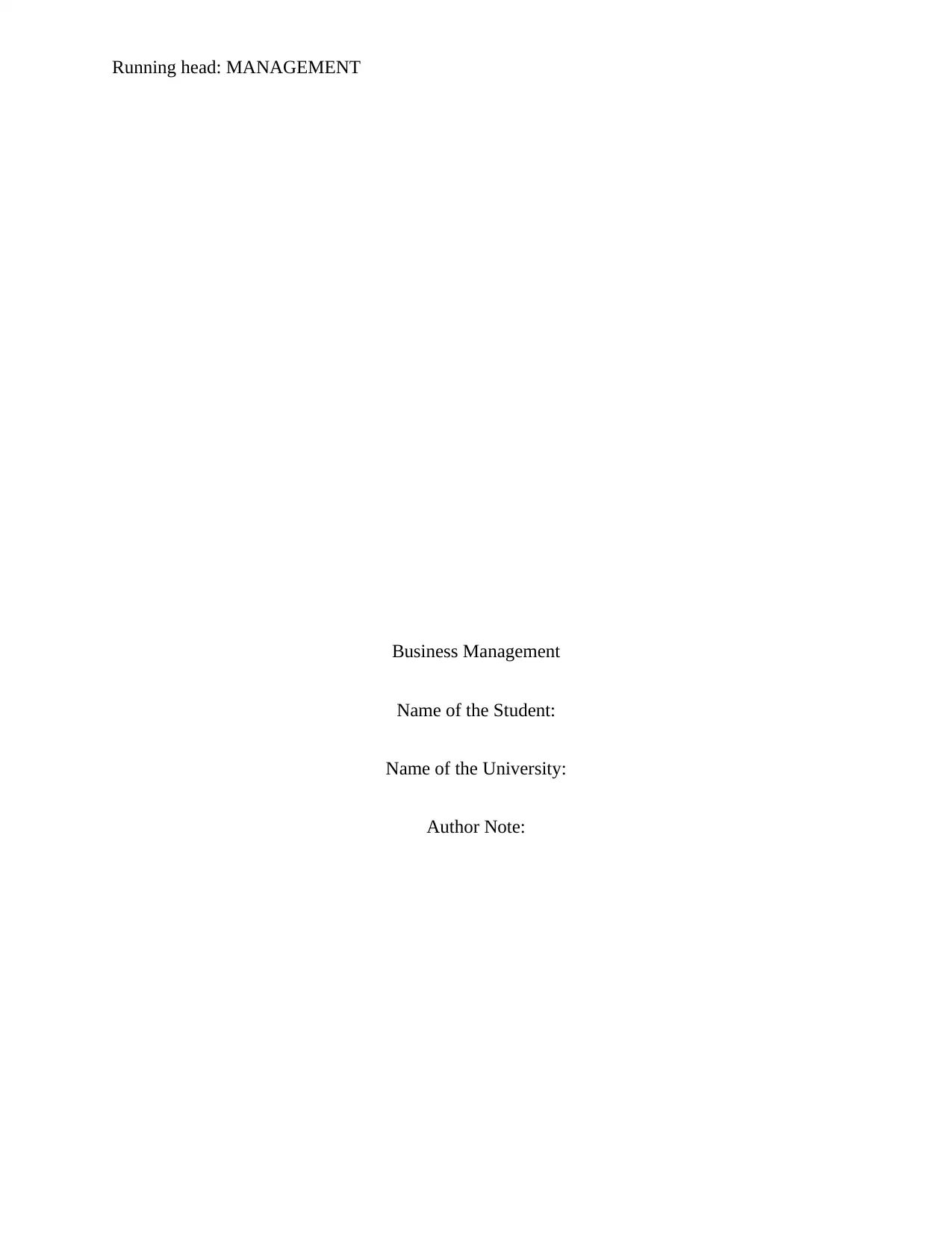
Running head: MANAGEMENT
Business Management
Name of the Student:
Name of the University:
Author Note:
Business Management
Name of the Student:
Name of the University:
Author Note:
Paraphrase This Document
Need a fresh take? Get an instant paraphrase of this document with our AI Paraphraser
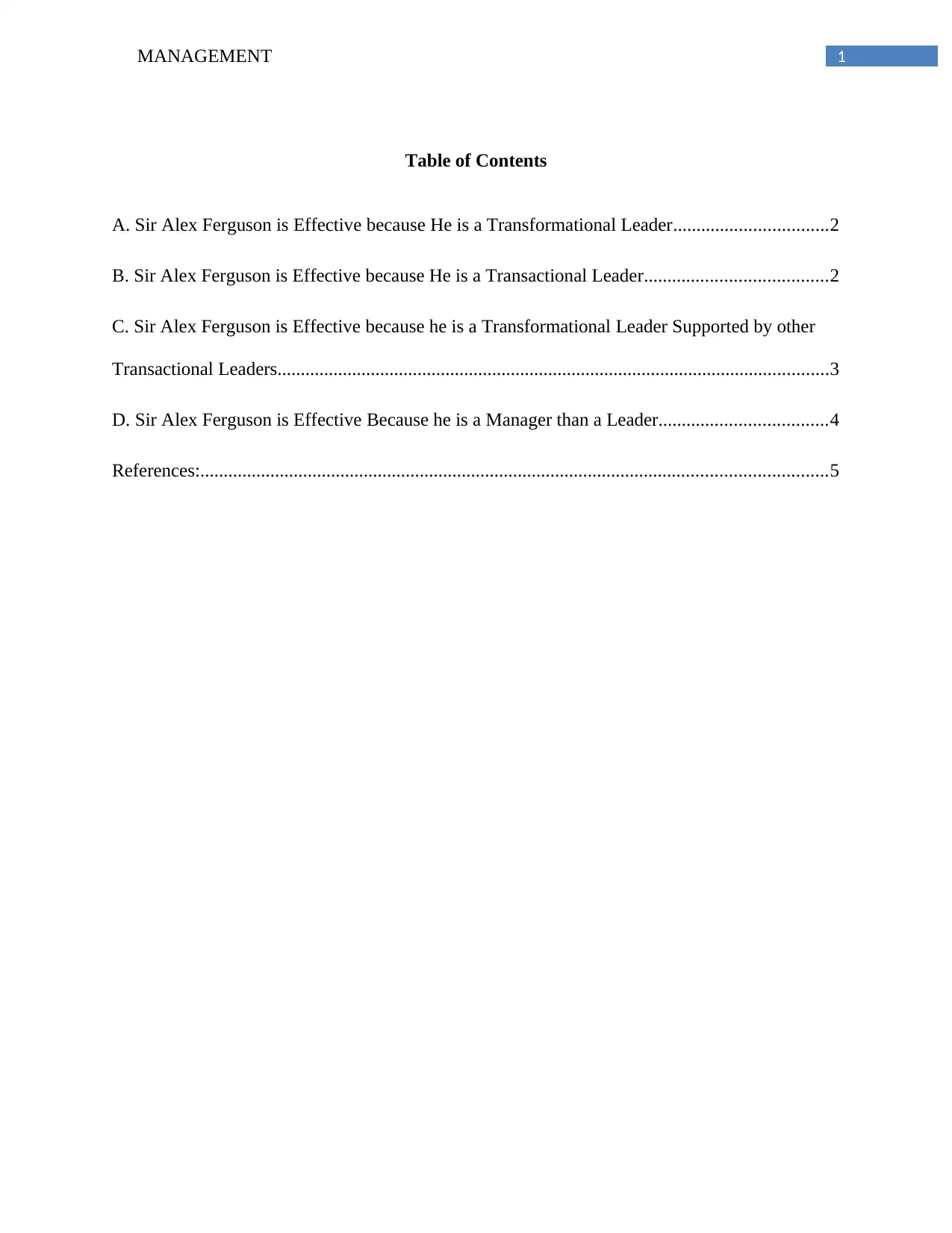
1MANAGEMENT
Table of Contents
A. Sir Alex Ferguson is Effective because He is a Transformational Leader.................................2
B. Sir Alex Ferguson is Effective because He is a Transactional Leader.......................................2
C. Sir Alex Ferguson is Effective because he is a Transformational Leader Supported by other
Transactional Leaders......................................................................................................................3
D. Sir Alex Ferguson is Effective Because he is a Manager than a Leader....................................4
References:......................................................................................................................................5
Table of Contents
A. Sir Alex Ferguson is Effective because He is a Transformational Leader.................................2
B. Sir Alex Ferguson is Effective because He is a Transactional Leader.......................................2
C. Sir Alex Ferguson is Effective because he is a Transformational Leader Supported by other
Transactional Leaders......................................................................................................................3
D. Sir Alex Ferguson is Effective Because he is a Manager than a Leader....................................4
References:......................................................................................................................................5
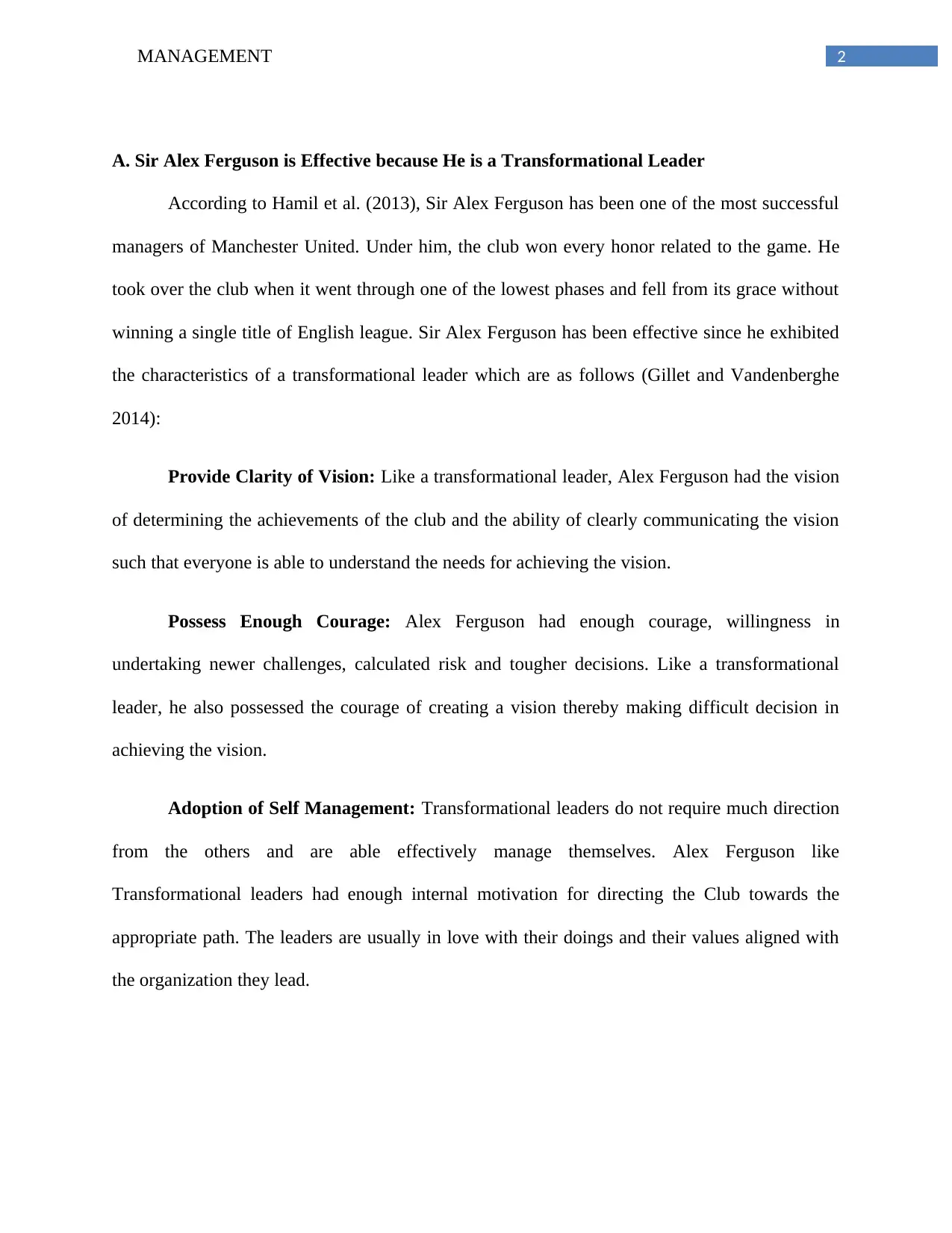
2MANAGEMENT
A. Sir Alex Ferguson is Effective because He is a Transformational Leader
According to Hamil et al. (2013), Sir Alex Ferguson has been one of the most successful
managers of Manchester United. Under him, the club won every honor related to the game. He
took over the club when it went through one of the lowest phases and fell from its grace without
winning a single title of English league. Sir Alex Ferguson has been effective since he exhibited
the characteristics of a transformational leader which are as follows (Gillet and Vandenberghe
2014):
Provide Clarity of Vision: Like a transformational leader, Alex Ferguson had the vision
of determining the achievements of the club and the ability of clearly communicating the vision
such that everyone is able to understand the needs for achieving the vision.
Possess Enough Courage: Alex Ferguson had enough courage, willingness in
undertaking newer challenges, calculated risk and tougher decisions. Like a transformational
leader, he also possessed the courage of creating a vision thereby making difficult decision in
achieving the vision.
Adoption of Self Management: Transformational leaders do not require much direction
from the others and are able effectively manage themselves. Alex Ferguson like
Transformational leaders had enough internal motivation for directing the Club towards the
appropriate path. The leaders are usually in love with their doings and their values aligned with
the organization they lead.
A. Sir Alex Ferguson is Effective because He is a Transformational Leader
According to Hamil et al. (2013), Sir Alex Ferguson has been one of the most successful
managers of Manchester United. Under him, the club won every honor related to the game. He
took over the club when it went through one of the lowest phases and fell from its grace without
winning a single title of English league. Sir Alex Ferguson has been effective since he exhibited
the characteristics of a transformational leader which are as follows (Gillet and Vandenberghe
2014):
Provide Clarity of Vision: Like a transformational leader, Alex Ferguson had the vision
of determining the achievements of the club and the ability of clearly communicating the vision
such that everyone is able to understand the needs for achieving the vision.
Possess Enough Courage: Alex Ferguson had enough courage, willingness in
undertaking newer challenges, calculated risk and tougher decisions. Like a transformational
leader, he also possessed the courage of creating a vision thereby making difficult decision in
achieving the vision.
Adoption of Self Management: Transformational leaders do not require much direction
from the others and are able effectively manage themselves. Alex Ferguson like
Transformational leaders had enough internal motivation for directing the Club towards the
appropriate path. The leaders are usually in love with their doings and their values aligned with
the organization they lead.
⊘ This is a preview!⊘
Do you want full access?
Subscribe today to unlock all pages.

Trusted by 1+ million students worldwide
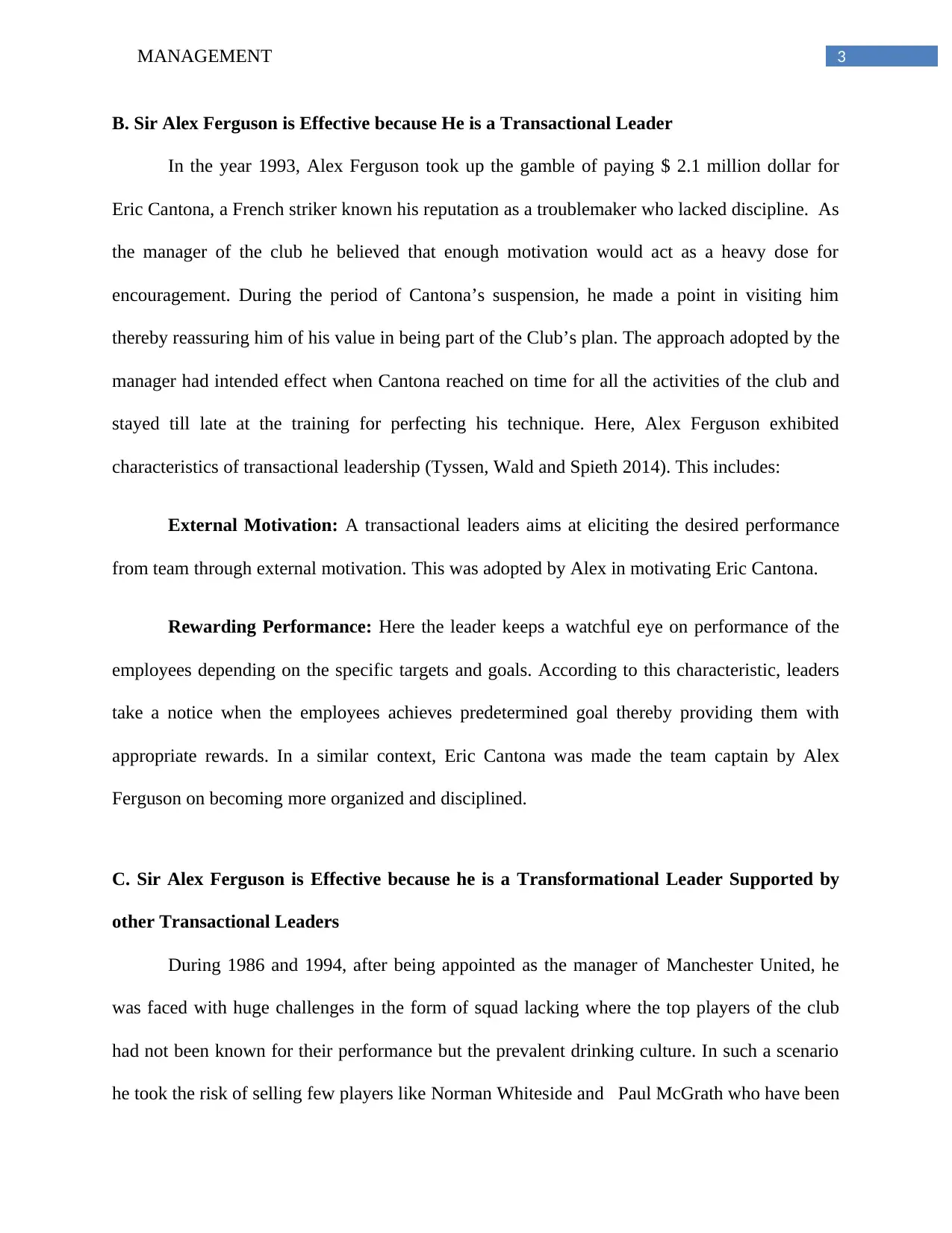
3MANAGEMENT
B. Sir Alex Ferguson is Effective because He is a Transactional Leader
In the year 1993, Alex Ferguson took up the gamble of paying $ 2.1 million dollar for
Eric Cantona, a French striker known his reputation as a troublemaker who lacked discipline. As
the manager of the club he believed that enough motivation would act as a heavy dose for
encouragement. During the period of Cantona’s suspension, he made a point in visiting him
thereby reassuring him of his value in being part of the Club’s plan. The approach adopted by the
manager had intended effect when Cantona reached on time for all the activities of the club and
stayed till late at the training for perfecting his technique. Here, Alex Ferguson exhibited
characteristics of transactional leadership (Tyssen, Wald and Spieth 2014). This includes:
External Motivation: A transactional leaders aims at eliciting the desired performance
from team through external motivation. This was adopted by Alex in motivating Eric Cantona.
Rewarding Performance: Here the leader keeps a watchful eye on performance of the
employees depending on the specific targets and goals. According to this characteristic, leaders
take a notice when the employees achieves predetermined goal thereby providing them with
appropriate rewards. In a similar context, Eric Cantona was made the team captain by Alex
Ferguson on becoming more organized and disciplined.
C. Sir Alex Ferguson is Effective because he is a Transformational Leader Supported by
other Transactional Leaders
During 1986 and 1994, after being appointed as the manager of Manchester United, he
was faced with huge challenges in the form of squad lacking where the top players of the club
had not been known for their performance but the prevalent drinking culture. In such a scenario
he took the risk of selling few players like Norman Whiteside and Paul McGrath who have been
B. Sir Alex Ferguson is Effective because He is a Transactional Leader
In the year 1993, Alex Ferguson took up the gamble of paying $ 2.1 million dollar for
Eric Cantona, a French striker known his reputation as a troublemaker who lacked discipline. As
the manager of the club he believed that enough motivation would act as a heavy dose for
encouragement. During the period of Cantona’s suspension, he made a point in visiting him
thereby reassuring him of his value in being part of the Club’s plan. The approach adopted by the
manager had intended effect when Cantona reached on time for all the activities of the club and
stayed till late at the training for perfecting his technique. Here, Alex Ferguson exhibited
characteristics of transactional leadership (Tyssen, Wald and Spieth 2014). This includes:
External Motivation: A transactional leaders aims at eliciting the desired performance
from team through external motivation. This was adopted by Alex in motivating Eric Cantona.
Rewarding Performance: Here the leader keeps a watchful eye on performance of the
employees depending on the specific targets and goals. According to this characteristic, leaders
take a notice when the employees achieves predetermined goal thereby providing them with
appropriate rewards. In a similar context, Eric Cantona was made the team captain by Alex
Ferguson on becoming more organized and disciplined.
C. Sir Alex Ferguson is Effective because he is a Transformational Leader Supported by
other Transactional Leaders
During 1986 and 1994, after being appointed as the manager of Manchester United, he
was faced with huge challenges in the form of squad lacking where the top players of the club
had not been known for their performance but the prevalent drinking culture. In such a scenario
he took the risk of selling few players like Norman Whiteside and Paul McGrath who have been
Paraphrase This Document
Need a fresh take? Get an instant paraphrase of this document with our AI Paraphraser
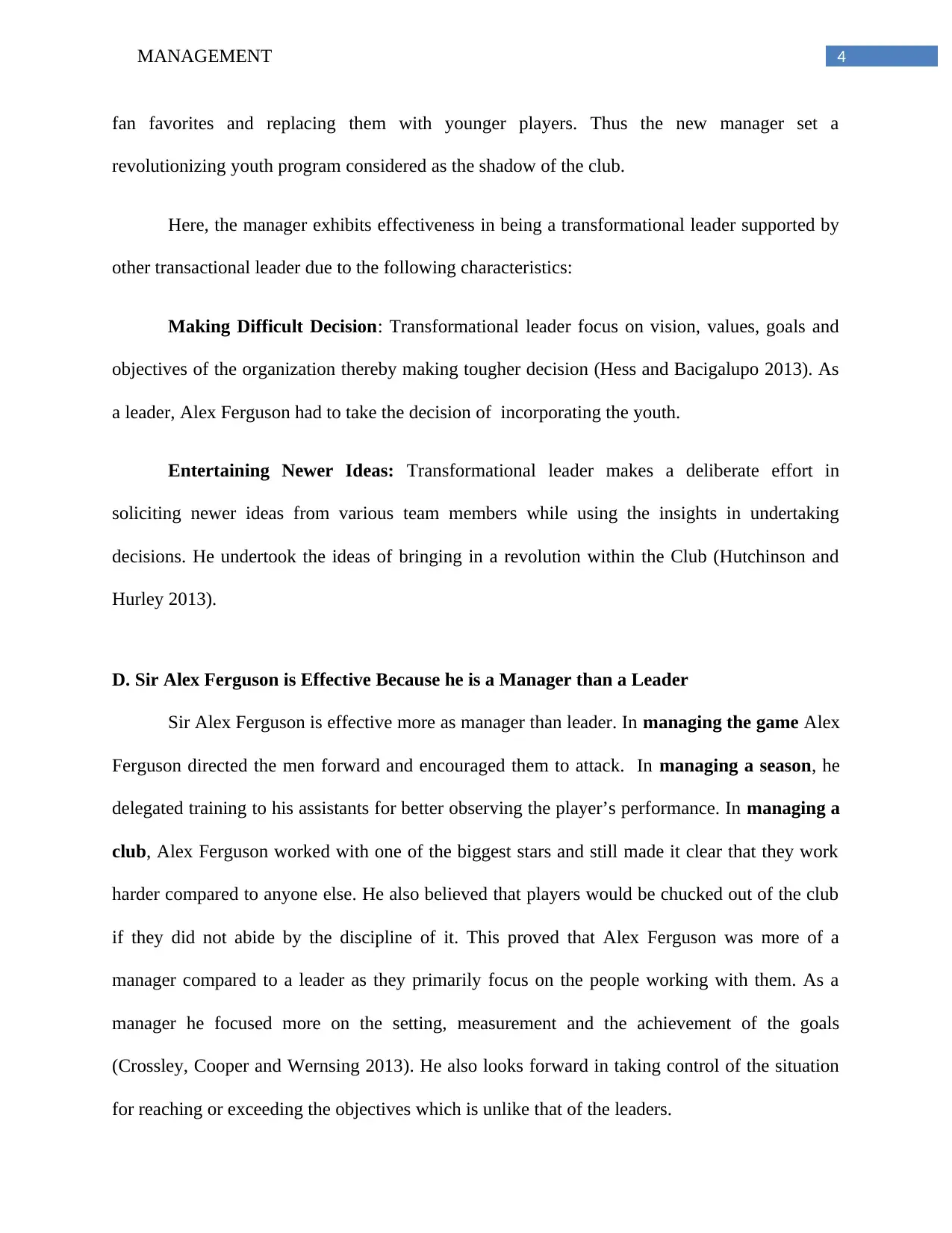
4MANAGEMENT
fan favorites and replacing them with younger players. Thus the new manager set a
revolutionizing youth program considered as the shadow of the club.
Here, the manager exhibits effectiveness in being a transformational leader supported by
other transactional leader due to the following characteristics:
Making Difficult Decision: Transformational leader focus on vision, values, goals and
objectives of the organization thereby making tougher decision (Hess and Bacigalupo 2013). As
a leader, Alex Ferguson had to take the decision of incorporating the youth.
Entertaining Newer Ideas: Transformational leader makes a deliberate effort in
soliciting newer ideas from various team members while using the insights in undertaking
decisions. He undertook the ideas of bringing in a revolution within the Club (Hutchinson and
Hurley 2013).
D. Sir Alex Ferguson is Effective Because he is a Manager than a Leader
Sir Alex Ferguson is effective more as manager than leader. In managing the game Alex
Ferguson directed the men forward and encouraged them to attack. In managing a season, he
delegated training to his assistants for better observing the player’s performance. In managing a
club, Alex Ferguson worked with one of the biggest stars and still made it clear that they work
harder compared to anyone else. He also believed that players would be chucked out of the club
if they did not abide by the discipline of it. This proved that Alex Ferguson was more of a
manager compared to a leader as they primarily focus on the people working with them. As a
manager he focused more on the setting, measurement and the achievement of the goals
(Crossley, Cooper and Wernsing 2013). He also looks forward in taking control of the situation
for reaching or exceeding the objectives which is unlike that of the leaders.
fan favorites and replacing them with younger players. Thus the new manager set a
revolutionizing youth program considered as the shadow of the club.
Here, the manager exhibits effectiveness in being a transformational leader supported by
other transactional leader due to the following characteristics:
Making Difficult Decision: Transformational leader focus on vision, values, goals and
objectives of the organization thereby making tougher decision (Hess and Bacigalupo 2013). As
a leader, Alex Ferguson had to take the decision of incorporating the youth.
Entertaining Newer Ideas: Transformational leader makes a deliberate effort in
soliciting newer ideas from various team members while using the insights in undertaking
decisions. He undertook the ideas of bringing in a revolution within the Club (Hutchinson and
Hurley 2013).
D. Sir Alex Ferguson is Effective Because he is a Manager than a Leader
Sir Alex Ferguson is effective more as manager than leader. In managing the game Alex
Ferguson directed the men forward and encouraged them to attack. In managing a season, he
delegated training to his assistants for better observing the player’s performance. In managing a
club, Alex Ferguson worked with one of the biggest stars and still made it clear that they work
harder compared to anyone else. He also believed that players would be chucked out of the club
if they did not abide by the discipline of it. This proved that Alex Ferguson was more of a
manager compared to a leader as they primarily focus on the people working with them. As a
manager he focused more on the setting, measurement and the achievement of the goals
(Crossley, Cooper and Wernsing 2013). He also looks forward in taking control of the situation
for reaching or exceeding the objectives which is unlike that of the leaders.

5MANAGEMENT
⊘ This is a preview!⊘
Do you want full access?
Subscribe today to unlock all pages.

Trusted by 1+ million students worldwide
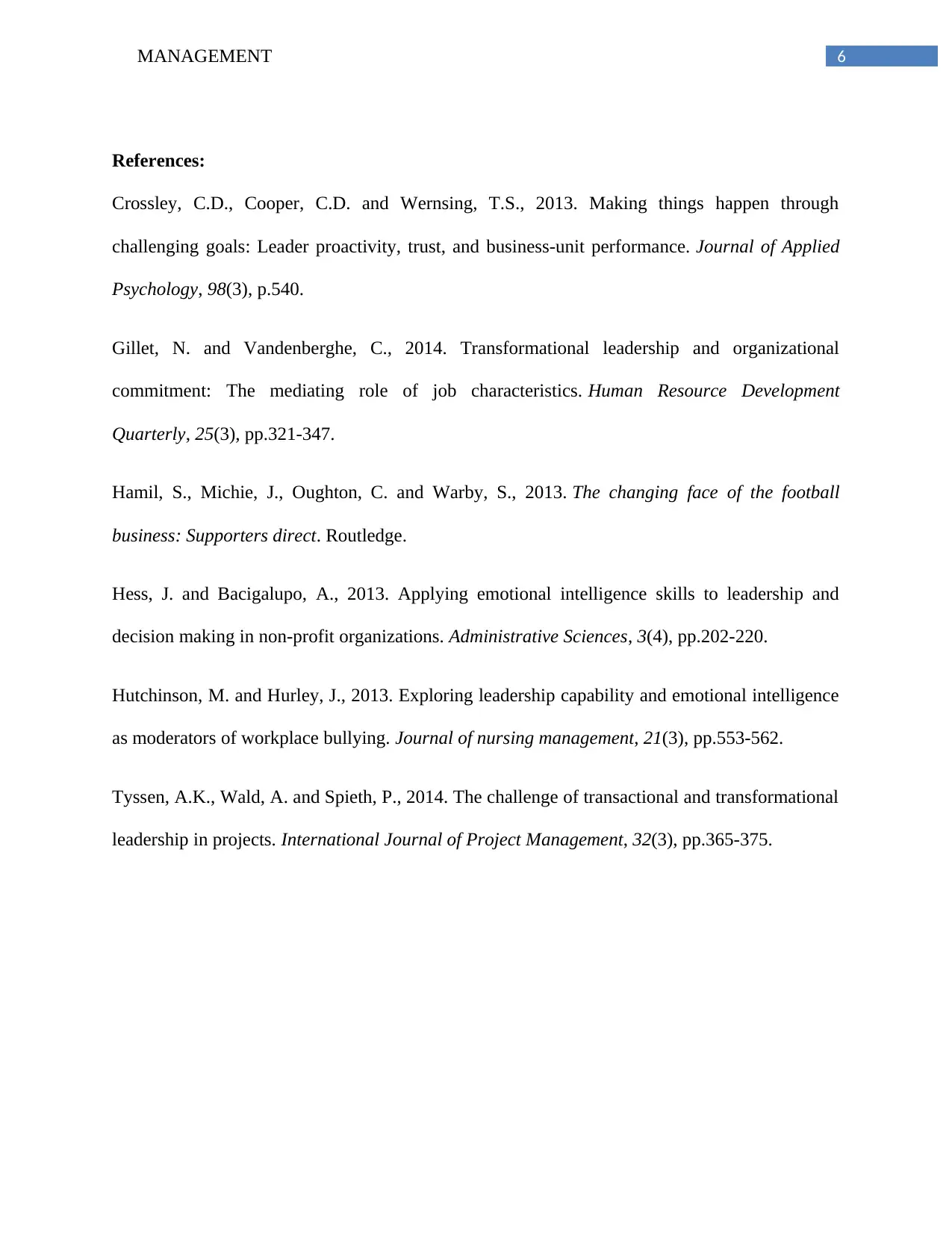
6MANAGEMENT
References:
Crossley, C.D., Cooper, C.D. and Wernsing, T.S., 2013. Making things happen through
challenging goals: Leader proactivity, trust, and business-unit performance. Journal of Applied
Psychology, 98(3), p.540.
Gillet, N. and Vandenberghe, C., 2014. Transformational leadership and organizational
commitment: The mediating role of job characteristics. Human Resource Development
Quarterly, 25(3), pp.321-347.
Hamil, S., Michie, J., Oughton, C. and Warby, S., 2013. The changing face of the football
business: Supporters direct. Routledge.
Hess, J. and Bacigalupo, A., 2013. Applying emotional intelligence skills to leadership and
decision making in non-profit organizations. Administrative Sciences, 3(4), pp.202-220.
Hutchinson, M. and Hurley, J., 2013. Exploring leadership capability and emotional intelligence
as moderators of workplace bullying. Journal of nursing management, 21(3), pp.553-562.
Tyssen, A.K., Wald, A. and Spieth, P., 2014. The challenge of transactional and transformational
leadership in projects. International Journal of Project Management, 32(3), pp.365-375.
References:
Crossley, C.D., Cooper, C.D. and Wernsing, T.S., 2013. Making things happen through
challenging goals: Leader proactivity, trust, and business-unit performance. Journal of Applied
Psychology, 98(3), p.540.
Gillet, N. and Vandenberghe, C., 2014. Transformational leadership and organizational
commitment: The mediating role of job characteristics. Human Resource Development
Quarterly, 25(3), pp.321-347.
Hamil, S., Michie, J., Oughton, C. and Warby, S., 2013. The changing face of the football
business: Supporters direct. Routledge.
Hess, J. and Bacigalupo, A., 2013. Applying emotional intelligence skills to leadership and
decision making in non-profit organizations. Administrative Sciences, 3(4), pp.202-220.
Hutchinson, M. and Hurley, J., 2013. Exploring leadership capability and emotional intelligence
as moderators of workplace bullying. Journal of nursing management, 21(3), pp.553-562.
Tyssen, A.K., Wald, A. and Spieth, P., 2014. The challenge of transactional and transformational
leadership in projects. International Journal of Project Management, 32(3), pp.365-375.
1 out of 7
Related Documents
Your All-in-One AI-Powered Toolkit for Academic Success.
+13062052269
info@desklib.com
Available 24*7 on WhatsApp / Email
![[object Object]](/_next/static/media/star-bottom.7253800d.svg)
Unlock your academic potential
Copyright © 2020–2025 A2Z Services. All Rights Reserved. Developed and managed by ZUCOL.





